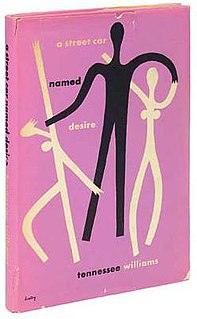
A Streetcar Named Desire is a play written by Tennessee Williams and first performed on Broadway on December 3, 1947. The play dramatizes the experiences of Blanche DuBois, a former Southern belle who, after encountering a series of personal losses, leaves her once-prosperous situation to move into a shabby apartment in New Orleans rented by her younger sister and brother-in-law.

Thomas Lanier Williams III, known by his pen name Tennessee Williams, was an American playwright and screenwriter. Along with contemporaries Eugene O'Neill and Arthur Miller, he is considered among the three foremost playwrights of 20th-century American drama.
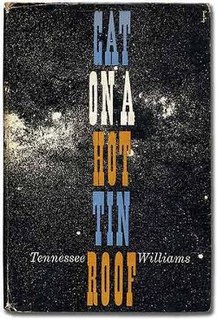
Cat on a Hot Tin Roof is a three-act play written by Tennessee Williams. An adaptation of his 1952 short story "Three Players of a Summer Game", the play was written by him between 1953 and 1955. One of Williams's more famous works and his personal favorite, the play won the Pulitzer Prize for Drama in 1955. Set in the "plantation home in the Mississippi Delta" of Big Daddy Pollitt, a wealthy cotton tycoon, the play examines the relationships among members of Big Daddy's family, primarily between his son Brick and Maggie the "Cat", Brick's wife.

Suddenly Last Summer is a one-act play by Tennessee Williams, written in New York in 1957. It opened off Broadway on January 7, 1958, as part of a double bill with another of Williams' one-acts, Something Unspoken. The presentation of the two plays was given the overall title Garden District, but Suddenly Last Summer is now more often performed alone. Williams said he thought the play "perhaps the most poetic" he had written, and Harold Bloom ranks it among the best examples of the playwright's lyricism.

Camino Real is a 1953 play by Tennessee Williams. In the introduction to the Penguin edition of the play, Williams directs the reader to use the Anglicized pronunciation "Cá-mino Réal." The play takes its title from its setting, alluded to El Camino Real, a dead-end place in a Spanish-speaking town surrounded by desert with sporadic transportation to the outside world. It is described by Williams as "nothing more nor less than my conception of the time and the world I live in."

The Glass Menagerie is a memory play by Tennessee Williams that premiered in 1944 and catapulted Williams from obscurity to fame. The play has strong autobiographical elements, featuring characters based on its author, his histrionic mother, and his mentally fragile sister. In writing the play, Williams drew on an earlier short story, as well as a screenplay he had written under the title of The Gentleman Caller.
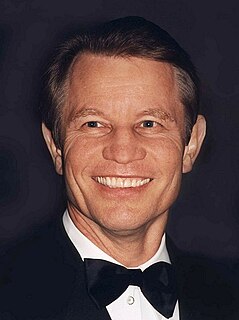
Michael YorkOBE is an English film, television, and stage actor. A two-time Emmy Award nominee, for the ABC Afterschool Special: Are You My Mother? (1986) and the AMC series The Lot (2001), he has appeared in more than 70 films, including Romeo and Juliet (1968), Cabaret (1972), The Three Musketeers (1973), Logan's Run (1976), and the Austin Powers film series (1997–2002).

Orpheus Descending is a three-act play by Tennessee Williams. It was first presented on Broadway on March 17, 1957 but had only a brief run and modest success. It was revived on Broadway in 1989, directed by Peter Hall and starring Vanessa Redgrave and Kevin Anderson. The production ran for 13 previews and 97 performances.
The Night of the Iguana is a stage play written by American author Tennessee Williams. It is based on his 1948 short story. In 1959, Williams staged it as a one-act play, and over the next two years he developed it into a full-length play, producing two different versions in 1959 and 1960, and then arriving at the three-act version that premiered on Broadway in 1961. Two film adaptations have been made: The Oscar-winning 1964 film directed by John Huston and starring Richard Burton, Ava Gardner, and Deborah Kerr, and a 2000 Croatian production.
John Henry Lahr is an American theater critic and writer. From 1992 to 2013, he was a staff writer and the senior drama critic at The New Yorker. He has written more than twenty books related to theater. Lahr has been called "one of the greatest biographers writing today."
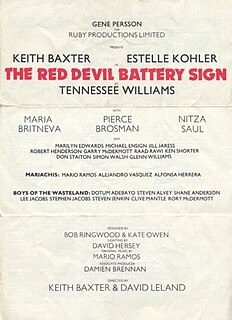
The Red Devil Battery Sign is a three-act play by American writer Tennessee Williams. He copyrighted the text in 1975 for its premiere in Boston, but revised the play in 1979; that later version was published by New Directions in 1988.
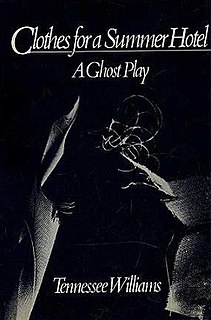
Clothes for a Summer Hotel is a two-act play written in 1979–80 by Tennessee Williams concerning the relationship between novelist F. Scott Fitzgerald and his wife Zelda. A critical and commercial failure, it was Williams' last play to debut on Broadway during his lifetime. The play takes place over a one-day visit Scott pays the institutionalized Zelda at Highland Mental Hospital in Asheville, North Carolina, with a series of flashbacks to their marriage in the twenties. Williams began work in 1976 on what he envisioned as a "long play" about the Fitzgeralds, and had Geraldine Page in mind to play Zelda from the start.

The Morosco Theatre was a Broadway theatre near Times Square in New York City from 1917 to 1982. It housed many notable productions and its demolition, along with four adjacent theaters, was controversial.
Peter Glenville was an English film and stage actor and director.

The Seven Descents of Myrtle is a play in seven scenes by Tennessee Williams. It started as a short story, The Kingdom of Earth, which Williams began in 1942 while in Macon, Georgia, but did not publish until 1954, in the limited edition of his story collection Hard Candy. Williams subsequently adapted the story into a one-act play, "Kingdom of Earth," published in the February 1, 1967, edition of Esquire magazine. He then expanded that play into a full-length seven-scene version, premiered the following year in New York with the title The Seven Descents of Myrtle and published on October 31, 1968, by New Directions as Kingdom of Earth. Its title character is reminiscent of another Williams' heroine, Blanche Dubois in A Streetcar Named Desire.

Small Craft Warnings is a two-act play by Tennessee Williams, written in late 1971 and early 1972. Williams expanded his two-scene play Confessional (1970), which had been published in his 1970 compilation Dragon Country, into this full-length play that centers on a motley group of people gathered in a seedy coastal bar in Southern California.
John D. Hancock is an American stage and film director, producer and writer. He is perhaps best known for his work on Bang the Drum Slowly. Hancock's theatrical work includes direction of both classic and contemporary plays, from Shakespeare to Saul Bellow.
The Two Character Play is an American play by Tennessee Williams that premiered in London at the Hampstead Theatre in December 1967. Williams himself had great affection for the play, and described it as follows:
Maria Britneva, Baroness St Just, was a Russian-British actress who was a close friend of Tennessee Williams. As co-trustee of the trust which he set up for his sister, she became his literary executor.













